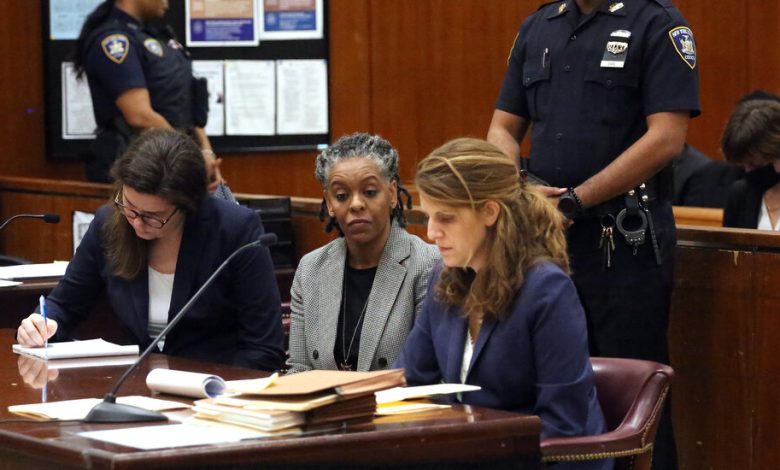Judge Criticizes D.A. for Halting Prosecution of Woman in Husband’s Death

A New York judge on Friday sharply criticized the Manhattan district attorney for declining to move forward with the murder trial of a woman who was arrested in 2020 after her estranged husband died of a stab wound, while reluctantly dismissing the case.
The dismissal of the case against the woman, Tracy McCarter, was issued by the State Supreme Court judge, Diane J. Kiesel, after the district attorney, Alvin L. Bragg, said in a letter last month that he could not allow the case to go forward.
Justice Kiesel, in unusually personal terms, blasted Mr. Bragg’s decision, noting the political pressure on him from Ms. McCarter’s many supporters, and saying that “sufficient questions of fact surround this case, crying out for the opportunity to be answered at a trial.”
“The court finds no compelling reason to dismiss the indictment, but for the district attorney’s unwillingness to proceed,” she wrote. “It is not in the interest of justice for the court to engage in a futile and unseemly standoff with the district attorney.”
But Justice Kiesel noted that Mr. Bragg could still seek a manslaughter charge against Ms. McCarter, a 47-year-old nurse, for the death of her husband, James Murray. The district attorney suggested in his letter that the judge had “foreclosed” that option, and said in court that he did not “understand it to be something” that prosecutors could do.
The unusual impasse will persist until at least the beginning of next year or until the district attorney announces a decision. The judge said in her order that she was keeping the case unsealed for 60 days to give the district attorney “the opportunity” to bring further charges, explicitly putting the onus on Mr. Bragg.
“Should the prosecution of this criminal transaction end with this written decision, it will be the district attorney’s choice, and not the result of any dilemma caused by this court,” the judge wrote.
In response to a question Friday about whether the district attorney’s office would charge Ms. McCarter with lesser crimes, including manslaughter, a spokeswoman, Emily Tuttle, said only, “We are reviewing the decision.”
For the time being, however, Justice Kiesel’s order means that Ms. McCarter is not currently accused of any crime.
“I am innocent,” Ms. McCarter said in a statement Friday. She said that she was devastated that her husband had lost his life, and that she and he both were “victims of the cruel disease of alcoholism.”
“Dismissing the unjust charge against me can’t give back what I’ve lost, but I am relieved that this nightmare will finally be over, and I am determined to thrive once again,” her statement said.
Ms. McCarter was arrested in 2020 and was charged by Mr. Bragg’s predecessor, Cyrus R. Vance Jr.
Her case began to attract public attention after she revealed when she was charged by prosecutors that she had been a victim of domestic violence. The publicity increased after her lawyers presented video and documentary evidence that Mr. Murray, who was 48 when he died, had been abusive toward Ms. McCarter for years.
And Mr. Bragg, while he was running for office as part of a movement of prosecutors emphasizing the importance of fairness in the justice system, noted that and voiced support for Ms. McCarter as part of his campaign, tweeting “I #StandWithTracy. Prosecuting a domestic violence survivor who acted in self-defense is unjust.”
(In a radio interview last month, Mr. Bragg said that his tweet was “a general assertion about survivors in the context of Ms. McCarter’s case” and that in retrospect, he should not have said it.)
Justice Kiesel also noted in her order that an organization that gave a substantial financial donation to Mr. Bragg, Color of Change, printed an advertisement in The New York Times calling on Mr. Bragg to drop the charges.
The judge hedged her political criticism, writing “To be clear, this court has no evidence of a quid pro quo and accepts the district attorney’s representation that he made his decision to drop the charges after independently reviewing the case.”
But she quoted a letter from Mr. Murray’s brother, Steven Murray, in which he wrote, “the D.A.’s actions have been focused solely on the defendant and not on seeking the truth and obtaining justice for Jim.”
In a separate interview this week, before the charge was dismissed, Steven Murray said, “All we want is to go to trial. We’ll live with the result.”
He said he did not believe Ms. McCarter’s version of events and that he had received a phone call from Mr. Bragg before the district attorney filed his letter.
Mr. Murray said he told the district attorney: “We’re not sitting here asking you to put Tracy away for the rest of her life, but she is clearly taking no responsibility for her actions, which resulted in my brother’s death, my niece not having a father anymore.”
The judge’s letter was also unusual for drawing on evidence that was not set to be presented by lawyers at trial, and for including a quote from the chief justice of the U.S. Supreme Court, John G. Roberts Jr.
“While I disagree with some of the reasoning in the decision, we are of course relieved that the case has been dismissed and that Ms. McCarter can begin to go on with her life,” said a lawyer for Ms. McCarter, Tess M. Cohen. “I hope that everyone can agree that a prosecutor who has a reasonable doubt about a case, like D.A. Bragg did here, should always dismiss.”
